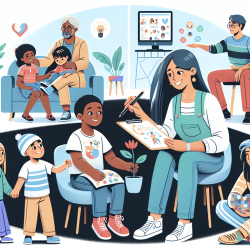Introduction
In the realm of speech-language pathology and social work, understanding the adjustment process for unaccompanied immigrant children (UC) in foster care is crucial. The study titled Unaccompanied Immigrant Children in ORR Foster Care: Community Level Facilitators of Adjustment Identified by Service Providers sheds light on the community-level strategies that aid these vulnerable children in their transition to life in the United States. This blog will delve into the key findings of the research and explore how practitioners can implement these strategies to improve outcomes for UC.
Key Findings from the Research
The research identifies several community-level facilitators that support the adjustment of UC in foster care. These include:
- Welcoming Communities: Communities that embrace diversity and inclusivity play a pivotal role in helping UC feel accepted and supported. Practitioners can advocate for policies that promote cultural competence and openness within communities.
- Inter-agency Collaboration: Collaboration between various service providers, including healthcare, legal, and educational institutions, enhances the support network for UC. Practitioners should foster partnerships to streamline services and resources.
- Community Relationships: Building strong relationships within the community, including mentorship programs, can provide UC with emotional and social support. Practitioners should encourage the development of formal and informal mentorship opportunities.
- Access to Healthcare: Ensuring that UC have access to culturally sensitive healthcare services is essential. Practitioners can work to bridge gaps in healthcare access and advocate for bilingual and bicultural providers.
- Church as a Resource: Faith-based organizations often offer emotional and social support to UC. Practitioners can collaborate with these organizations to provide additional resources and support.
Implications for Practitioners
Practitioners working with UC can leverage these findings to enhance their practice. By advocating for welcoming policies and fostering community relationships, practitioners can create a supportive environment for UC. Additionally, collaborating with various agencies and organizations can ensure that UC receive comprehensive care and support.
Furthermore, practitioners should consider engaging in research to further explore the impact of community-level strategies on UC adjustment. This can involve participatory approaches that include UC in the research process, providing them with a voice and agency in shaping the services they receive.
Conclusion
The study highlights the importance of community-level strategies in supporting the adjustment of unaccompanied immigrant children in foster care. By implementing these strategies, practitioners can play a crucial role in improving outcomes for UC and ensuring their successful integration into US communities.
To read the original research paper, please follow this link: Unaccompanied Immigrant Children in ORR Foster Care: Community Level Facilitators of Adjustment Identified by Service Providers.










